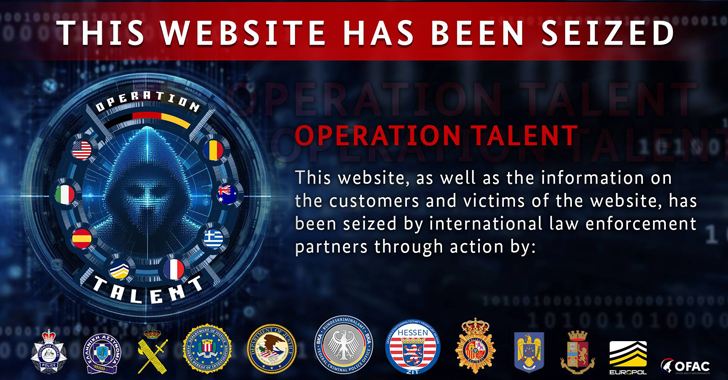
International law enforcement agencies have struck a decisive blow against the dark corners of the internet. On Wednesday, the FBI, Europol, and their global partners launched a coordinated raid under the codename “Operation Talent.” The operation led to the immediate takedown of four prominent hacker platforms: Cracked.io, Nulled.to, MySellIX.io, and StarkRDP.io.
Visitors attempting to access these sites are now met with a stark warning: both the platforms and their user data are in the hands of law enforcement. The takedown was a collaborative effort spanning seven nations—Australia, France, Greece, Germany, Italy, Romania, and Spain—with additional support from the U.S. Department of Justice and the Office of Foreign Assets Control (OFAC).
The first indication of the crackdown surfaced on Cracked.io’s Telegram channel, “Cracked Announcements.” Interestingly, the site’s administrators initially mistook the disruption for a technical outage—at approximately 5 AM Eastern Time, they posted about supposed data center issues. By midday, however, they were forced to acknowledge the grim reality: the domain had been seized.
In their final statement, forum administrators admitted they were still in the dark about the specific grounds for the seizure, awaiting official documentation from their data center and domain registrar. Their message concluded with a resigned lament: “A sad day for our community.”
Each of the shuttered platforms played a distinct role in the cybercrime ecosystem. Cracked.io and Nulled.to functioned as hubs for sharing hacking tools, exploit guides, and stolen data. MySellIX.io served as a marketplace where cybercriminals could set up online stores for illicit goods and services. StarkRDP.io facilitated unauthorized access to Windows RDP and virtual machines.
Reports from online sources indicate that other platforms, including SellIX and RDP.sh, were also affected by the crackdown. Notably, some bloggers claim that these sites were allegedly operated by a network of individuals based in Germany.
On Wednesday, a Europol spokesperson confirmed to Reuters that the operation was ongoing and assured that further details would be disclosed in the coming days.
The reaction from the online community has been divided. On Reddit, some users defended the targeted sites, citing their long-standing presence. “How can a forum that has operated for over a decade be considered ‘fraudulent’?” wondered one user, Neon Prime.
However, the majority of commentators welcomed the law enforcement action. A user named FilthyDoinks, who claims to have monitored such services since 2007, shed light on the darker realities of these forums. According to him, Cracked.io was riddled with malware, with many so-called hacking tools serving as mere traps—infecting the devices of unsuspecting newcomers attempting to download them.
FilthyDoinks’ own experience is a cautionary tale—he fell victim to a scam on CrazyRDP, an anonymous hosting service heavily promoted on hacker forums. The platform’s owner eventually turned against his own customers, hacking into their accounts and blackmailing them.
The discussion also revived memories of previous high-profile takedowns—such as the seizure of RaidForums in March 2022 and its successor, BreachForums, in the spring of the following year. However, BreachForums has resurfaced multiple times under new domains.
A particularly intriguing twist in the story involves the notorious hacker IntelBroker. Shortly before the raid, he shifted his activities to Cracked.io after abandoning Breached—a platform he allegedly administered before it was dismantled by the FBI last year. IntelBroker gained notoriety for his January breach of Hewlett Packard and had previously targeted Cisco, Europol, Apple, AMD, GE, and US Cellular.
Cybersecurity researchers agree that the takedown has dealt a significant blow to the cybercriminal underground. Yet, history has shown that dismantled forums often give rise to new successors. Still, Operation Talent serves as a stark reminder that international cooperation in combating cyber threats is becoming increasingly effective.


